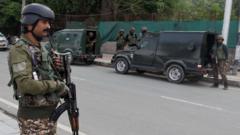Military leaders from India and Pakistan are scheduled to engage in discussions regarding the recent ceasefire agreement that ended nearly four days of intense conflict. The ceasefire, facilitated by the United States, has maintained stability since it was declared on Saturday, following a surge of violence that left casualties on both sides.
India and Pakistan Military Leaders Set to Discuss Ceasefire After Recent Hostilities

India and Pakistan Military Leaders Set to Discuss Ceasefire After Recent Hostilities
Top officials from both nations to discuss ceasefire details amidst cautious optimism and past tensions.
The ceasefire marks a significant pause in hostilities that saw extensive shelling and aerial skirmishes between the two nuclear-armed nations. U.S. President Donald Trump announced the truce, emphasizing the need to prevent further escalation, which could have led to catastrophic consequences.
Tensions between India and Pakistan have long persisted, primarily revolving around territorial disputes in Kashmir, a region both nations contest. Previous conflicts have erupted over these territorial claims, leading to several wars between the two neighbors. In the last round of aggression, reports indicate that several dozen lives were lost due to artillery fire near the Line of Control, which serves as the de facto border.
Since the ceasefire, both countries have claimed military successes, citing strikes against the opponent's positions. Notably, India asserts it targeted multiple installations in Pakistan as retaliation for a deadly militant attack earlier in May. Pakistan has also claimed it responded with strikes against Indian facilities, emphasizing the ongoing nature of their rivalry despite the temporary cessation of attacks.
Both nations continue to exercise caution, warning one another against violating the ceasefire terms, highlighting the fragility of the current peace. While both sides have contested claims regarding losses and strikes, the recent dialogue aims to address these tensions and foster a more sustainable resolution.
As the situation develops, the focus remains on the discussions scheduled for later today that could shape the future of relationships between these two historically adversarial nations.
The ceasefire, while a hopeful pause, illustrates the delicate balance of power and ongoing animosities that characterize India-Pakistan relations.
Tensions between India and Pakistan have long persisted, primarily revolving around territorial disputes in Kashmir, a region both nations contest. Previous conflicts have erupted over these territorial claims, leading to several wars between the two neighbors. In the last round of aggression, reports indicate that several dozen lives were lost due to artillery fire near the Line of Control, which serves as the de facto border.
Since the ceasefire, both countries have claimed military successes, citing strikes against the opponent's positions. Notably, India asserts it targeted multiple installations in Pakistan as retaliation for a deadly militant attack earlier in May. Pakistan has also claimed it responded with strikes against Indian facilities, emphasizing the ongoing nature of their rivalry despite the temporary cessation of attacks.
Both nations continue to exercise caution, warning one another against violating the ceasefire terms, highlighting the fragility of the current peace. While both sides have contested claims regarding losses and strikes, the recent dialogue aims to address these tensions and foster a more sustainable resolution.
As the situation develops, the focus remains on the discussions scheduled for later today that could shape the future of relationships between these two historically adversarial nations.
The ceasefire, while a hopeful pause, illustrates the delicate balance of power and ongoing animosities that characterize India-Pakistan relations.





















